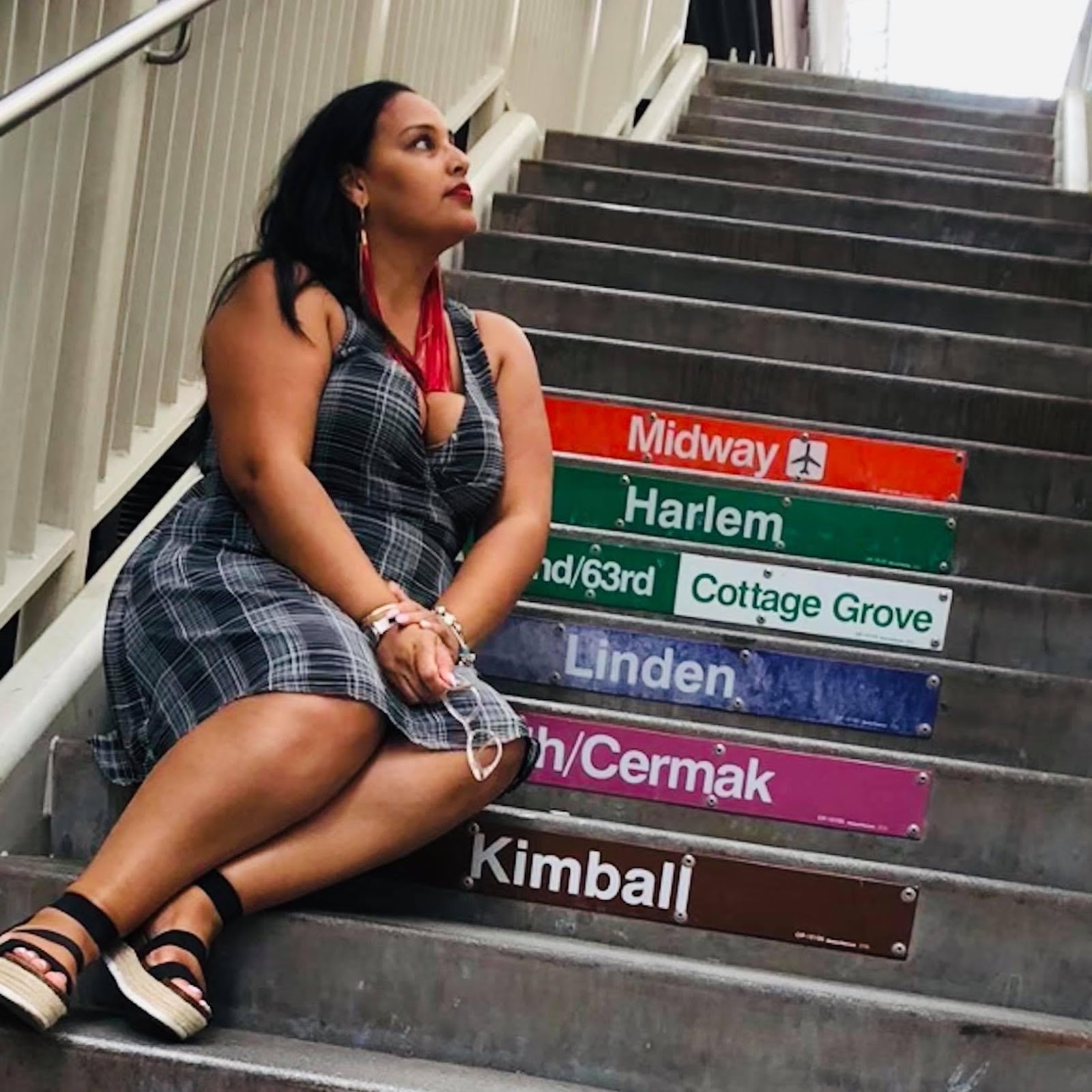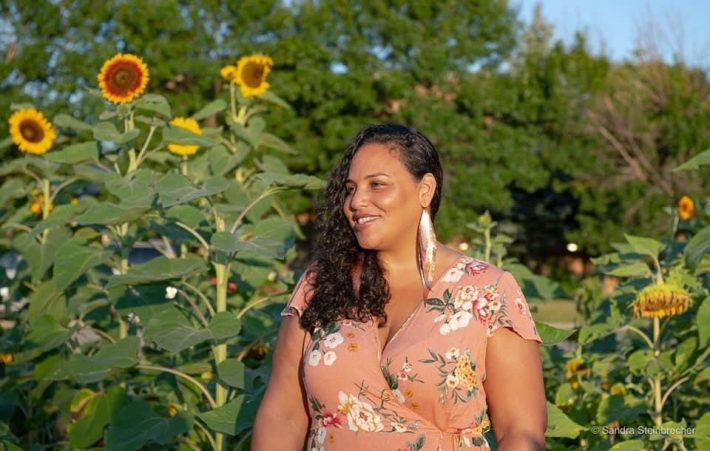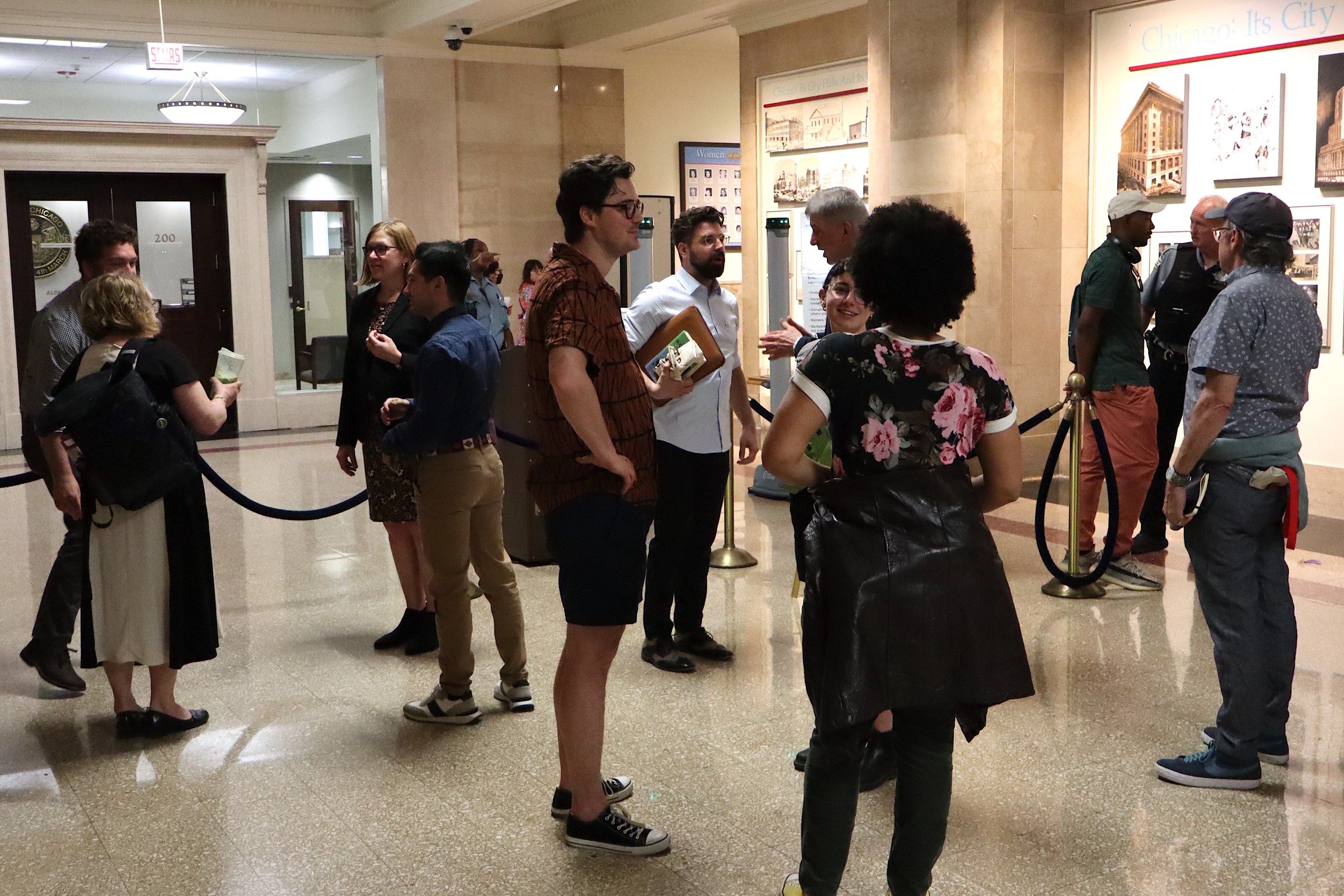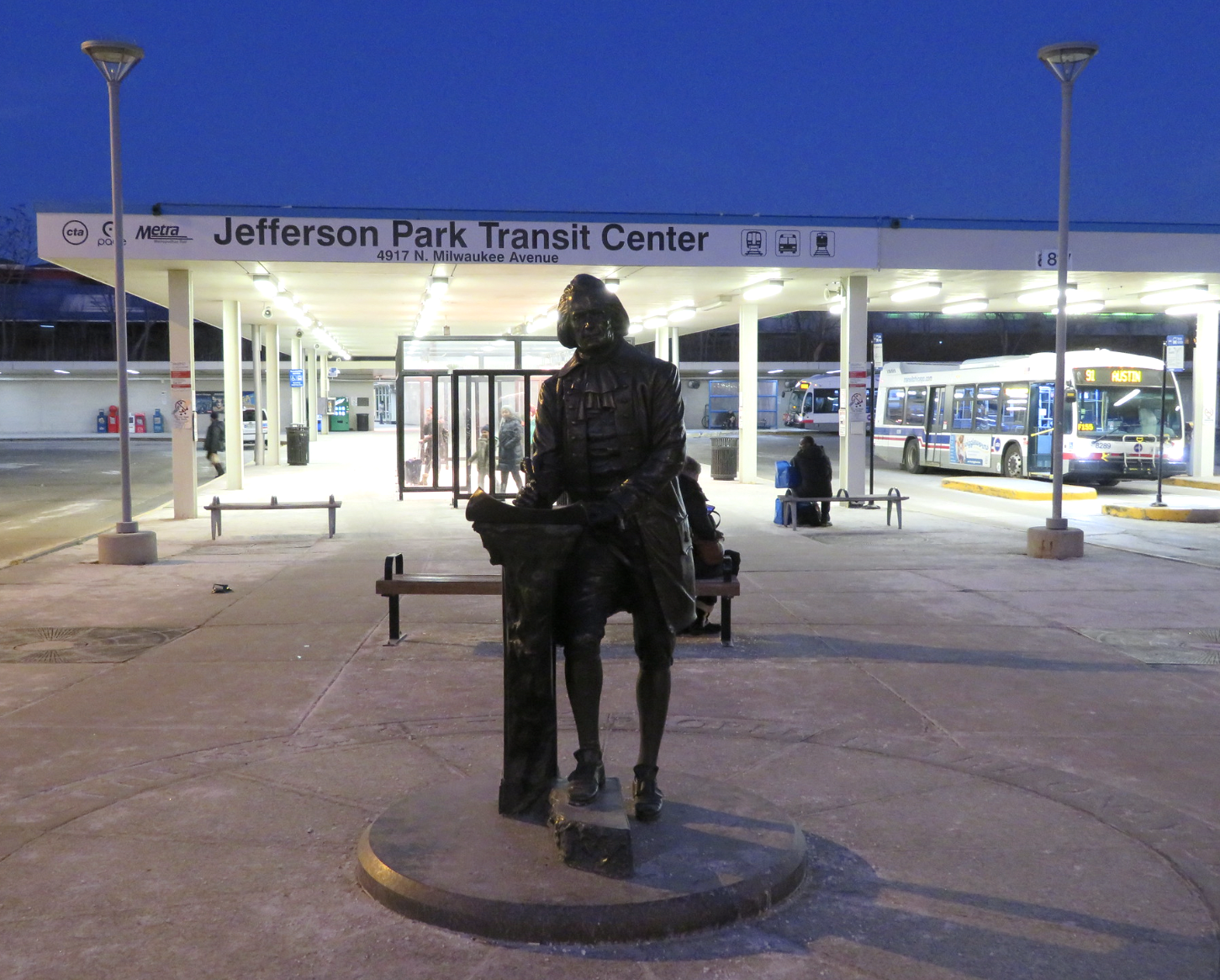Chicago Latine Transportation Leaders: Leslé Honoré
8:03 PM CDT on May 1, 2023

Leslé Honoré on the stairs to the CTA ‘L’. Photo: Lawerence Tolefree
Streetsblog Chicago is interviewing local Latine transportation leaders in an effort to recognize the diversity, contributions and the presence of people who have helped and continue to shape transportation in Chicago. In April, I interviewed Leslé Honoré, an artist, poet, writer, and transportation advocate. She is the Chief Executive Officer of Urban Gateways, an organization that engages and provides young people with arts programming. Leslé was also recently named the Co-Chair for Mayor Elect Brandon Johnson’s Arts and Culture subcommittee.
Ruth Rosas: In your career, you have accomplished so many things. Tell us a bit about yourself.
Leslé Honoré: I'll start at the beginning. I'm first generation, the daughter of a woman who immigrated from Sinaloa, Mexico when she was 15. My father was African American from New Orleans. Louisiana. I Identify as Blaxican, not Afro-Latina. I’m grateful we have those terms but I believe that is really specific for someone who phenotypically presents as Black, but has Latine heritage.
As long as I can remember, growing up in L.A. in the 1990s there wasn't even the ability to identify as multi-racial in the census until the late 1990s. But L.A was some place that was full of both of my cultures so it was easy to navigate those spaces in ways that were important to me. I went to college in New Orleans, lived in Indianapolis for about a year and then moved to Chicago in 1999 and I've been here ever since.
I love this city, it's where I've planted my roots, found my tribe, raised my kids and dedicated my life to. The majority of the time here, I've lived on the South Side of Chicago. I recently moved to Humboldt Park.
My heritage is really important to me and it's what I lead with in all things that I do. Outside of the transportation world, I am CEO of Urban Gateways, which is Chicago's oldest non-profit that focuses on arts exposure and opening gates that are often closed to people who are marginalized.
But before any of that, I am a writer. I've been writing all my life. I wrote my first book of poetry in 2017. I have a children's book called Brown Girl coming out in summer of 2024.
So those are kind of like all my hyphenations: mother, daughter, sister, friend.
RR: In terms of transportation, what brought you into that space?
LH: About 6 years ago, I was Executive Director at a non-profit on the South Side of Chicago. I was approached by Roberto Requejo, who's Elevated Chicago’s Executive Director because someone had recommended me for a role on the Steering Committee.
I had never heard of the concept of equitable transit-oriented development. I had been around developers, construction workers, friends, and activists who talked about developments happening in the community. But when it comes to transit, I, like many people, used transit because I needed it. Because it’s how we get around, our kids use it, it’s just a part of life. But as you travel across neighborhoods on transit, you notice the differences, the things some communities have that yours doesn’t. Many times, we know that things are inequitable, but we don’t know why or how to change it so we collectively deal with the frustrations. You don’t really have time to unpack the whys.
Elevated was my introduction to a more expanded "why" of what I already knew was because of systemic racism. It gave me the ability to be part of helping change or shift the system by bringing my lived experiences to places where lived experiences weren’t plentiful. Because in those places, degrees are plentiful, titles are plentiful, decision makers are plentiful. People working in theory, who think they know what is best and what needs to be changed are plentiful. That is where my transportation advocacy began, disrupting theory with life.
RR: We don’t often see people with your skills and background in transportation spaces. How do you see your work as a writer, poet, artist and transportation advocate intersecting?
LH: In every position of leadership that I have matriculated through in the past five years it has been first and foremost because I am a poet and I communicate differently than other people do. I think poetry is much more direct. Poetry is really about getting to the emotion of what is happening. And I think when we get into these spaces, especially urban planning and development, the humanization of space is what is missing the most.
The arts are how we have always told our stories. Before there was even written language, there were paintings on walls of people who recorded their lives. Without incorporating how we express, share, record, or dream about our future, we create spaces that feel sterile and unwelcoming.
I’m forever grateful to be able to incorporate and weaponize my art in spaces to help people understand the choices that we’ve historically made for communities and how much damage it has caused and long lasting those choices have been. White supremacy and systemic racism have many forms and expressions and art is how I unpack that.
When you look at Black and Brown communities historically, we have always unpacked our pain and shared our celebrations through art. It is in the fiber of our being. So it cannot be excluded from transportation spaces either. And for me, Elevated Chicago has been grounding in that journey.
It comes in the way of opening up meetings with city leaders with poetry, or looking for ways to fund public art because public art is public health, finding ways to do cross-cultural community art projects in Black and Brown communities to celebrate our differences and how we can be stronger in our fight together. I’m grateful to be able to share that with other people who are doing similar work
RR: How do you see art shaping public discourse?
LH: The important thing is for us not to speak about that as if it's a new phenomenon, whether we have supported it or not, whether we funded it or not, or whether people want to acknowledge it or not. There is no pamphlet, whether you agree with the topic or not, that was not designed. There is no piece of communication, whether you agree with it or not, that was not written or workshopped by someone or a team. It is how we communicate. There is nothing that art does not touch. The arts are also political. All political candidates work on logos, posters and yard signs that are designed with specificity. We need the arts and we cannot continue to undervalue the arts.
Within Elevated Chicago, we ensure that artists are being paid the same way as any consultant would be paid for their time, knowledge, and expertise. We built it into the budget and ensured the arts are covered equitably. We are constantly looking for artistic voices in all of the communities we represent.
For example, one of our largest wins in the summer of 2022 was the Connected Communities Ordinance. Zoning laws are complicated on purpose so that everyday people are excluded from understanding how zoning limits how the city grows. I learned that there were zoning ordinances that do not allow for 2- or 3-flats near transit in certain wealthy neighborhoods in Chicago so that those neighborhoods become off limits to people with certain incomes. Those neighborhoods can and want to restrict who can move into their community and limit who has access to things that all our taxes pay for. So how do you tell that story, as complicated and as messy as it is? You do it through the arts, through design, and through thoughtful words and images that you share.

RR: What is a project or initiative that you’ve worked on that you’re particularly proud of and reflect your values?
LH: Leading an arts organization that focuses on access to the arts for everyone is important to me. I have been so fortunate to land in the perfect place where purpose, passion and my gifts can all be incorporated. And Elevated Chicago was my training for that.
As Elevated Chicago’s co-chair, I am often at tables where artists aren’t typically invited, tables that discuss policy and laws with decision makers that don’t typically look like me or have my background. One of Elevated Chicago’s core engagement principles is to always look for who else needs to be at the table and how to bring them there. I cannot think of a place that I go to where I’m not thinking about that, it is something I live by because so many people have also helped me with opportunities.
There is so much to be proud of. With Elevated Chicago, we always start steering committee meetings with some form of art, whether it's music, a song from a local artist, poetry or visual art. We are committed to reminding people that art is how we heal and hope and we make space for it.
We also do other projects such as sunflower planting in the summer. I think sunflowers are such a beautiful symbol of what people can do when they come together. Sunflowers aren’t just pretty, they pull toxicity out of the soil. When we do this type of work we bring people together from different communities and we pull the toxicity out of our histories and plant hope. This is how we grow unity, solidarity and power.
RR: Thank you so much for chatting with me Lesle. The work you do is incredibly inspiring.
Stay in touch
Sign up for our free newsletter
More from Streetsblog Chicago
They can drive 25: Residents, panelist support lowering Chicago’s default speed limit
While there's no ordinance yet, the next steps are to draft one, take a committee vote and, if it passes, put it before the full City Council.
One agency to rule them all: Advocates are cautiously optimistic about proposed bill to combine the 4 Chicago area transit bureaus
The Active Transportation Alliance, Commuters Take Action, and Equiticity weigh in on the proposed legislation.



